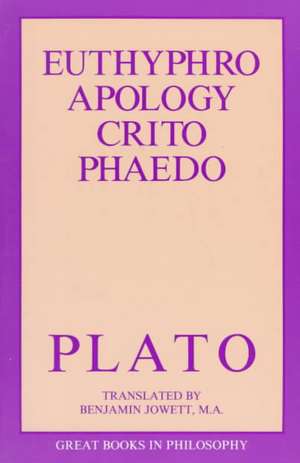The Euthyphro, Apology, Crito, and Phaedo: Great Books in Phiilosophy
Autor Plato Editat de Robert M. Baird, Stuart E. Rosenbaumen Limba Engleză Paperback – 31 aug 1988
In these four short works by Plato, we come to experience the full range of Socrates' penetrating mind. In the Euthyphro, Socrates searches after the truth about the nature of piety, even as he makes his way to Athens to answer an indictment leveled against him.
The Apology recounts Socrates' attempt to defend himself against the charge of impiety. Once condemned, Socrates finds himself imprisoned to await death.
The Crito captures his views on his relationship with the state and what each has a right to expect from the other.
Finally, the Phaedo recalls the death scene as Socrates discusses the nature of the soul and immortality just before succumbing to the hemlock.
Preț: 73.94 lei
Nou
Puncte Express: 111
Preț estimativ în valută:
14.15€ • 14.72$ • 11.86£
14.15€ • 14.72$ • 11.86£
Carte tipărită la comandă
Livrare economică 13-27 martie
Preluare comenzi: 021 569.72.76
Specificații
ISBN-13: 9780879754969
ISBN-10: 0879754966
Pagini: 138
Dimensiuni: 143 x 218 x 8 mm
Greutate: 0.18 kg
Ediția:Revised
Editura: Prometheus Books
Seria Great Books in Phiilosophy
ISBN-10: 0879754966
Pagini: 138
Dimensiuni: 143 x 218 x 8 mm
Greutate: 0.18 kg
Ediția:Revised
Editura: Prometheus Books
Seria Great Books in Phiilosophy
Notă biografică
Plato (c.428 to c.347 bc) was an Athenian philosopher during the Classical period in Ancient Greece, founder of the Platonist school of thought, and the Academy, the first institution of higher learning in the Western world. He is widely considered the pivotal figure in the history of Ancient Greek and Western philosophy, along with his teacher, Socrates, and his most famous student, Aristotle.
Plato was the innovator of the written dialogue and dialectic forms in philosophy. Plato is also considered the founder of Western political philosophy. His most famous contribution is the theory of Forms known by pure reason, in which Plato presents a solution to the problem of universals known as Platonism (also ambiguously called either Platonic realism or Platonic idealism. He is also the namesake of Platonic love and the Platonic solids.
His own most decisive philosophical influences are usually thought to have been along with Socrates, the pre-Socratics Pythagoras, Heraclitus and Parmenides, although few of his predecessors' works remain extant and much of what we know about these figures today derives from Plato himself. Unlike the work of nearly all of his contemporaries, Plato's entire body of work is believed to have survived intact for over 2,400 years. Although their popularity has fluctuated over the years, the works of Plato have never been without readers since the time they were written.
